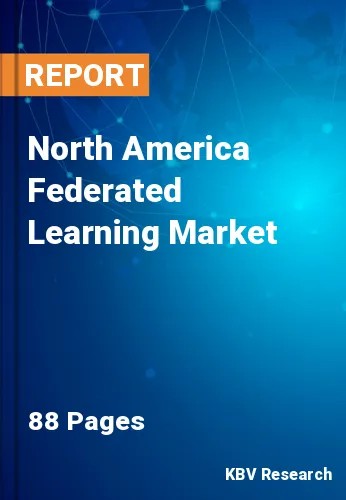The North America Federated Learning Market would witness market growth of 10.5% CAGR during the forecast period (2022-2028).
The federative learning model aims to help industries use data more effectively and accurately across organizations while also meeting privacy, security, and regulatory requirements, as well as building more robust and flexible frameworks to enable business collaboration by using data cohesively, but without direct data exchange. Federated learning allows learning to take place while several data sets remain in place. No data exchanges on the raw data are required to maintain privacy and confidentiality, making it a viable solution to the data isolation problem.
Rather than accumulating data on a specific server, the federated learning method locks the data on servers, with just the algorithms and prediction models moving between them. The purpose of this strategy is for each user to gain access to a bigger pool of data than they have access to on their own, resulting in improved machine learning performance while maintaining data ownership and privacy. The capacity to build machine learning models at scale across many healthcare facilities without pooling data is a vital tool for addressing patients' privacy and data security concerns. A successful application of federated learning could pave the way for large-scale precision medicine, allowing doctors to provide the appropriate diagnosis to the right patient at the right time.
There is a rapid adoption of digitization in this region, which is enabling companies to optimize and accelerate their operations. For the current generation, digitalization is an opportunity. Workplaces, company structures, and value chains, as well as innovations and market structures, are all being transformed by it. The Gramm-Leach-Bliley Act, the Health Insurance Portability and Accountability Act, the Children's Online Privacy Protection Act, and others are among the federal statutes that safeguard individuals' personal data or address cybersecurity. The Federal Trade Commission (FTC), the Department of Health and Human Services (HHS), and the Consumer Financial Protection Bureau (CFPB) are among the institutions that enforce these regulations. These rules primarily govern specific sectors and data subcategories. By implementing a strict prohibition against false and misleading data protection practices, the FTC addresses some of the statutory loopholes. In addition, no federal legislation oversees the gathering and use of personal data by consumers.
The US market dominated the North America Federated Learning Market by Country in 2021, and would continue to be a dominant market till 2028; thereby, achieving a market value of $46,028.1 Thousands by 2028. The Canada market is poised to grow at a CAGR of 13% during (2022 - 2028). Additionally, The Mexico market would witness a CAGR of 12% during (2022 - 2028).
Based on Application, the market is segmented into Drug Discovery, Risk Management, Online Visual Object Detection, Data Privacy & Security Management, Industrial Internet of Things, Augmented Reality/Virtual Reality, Shopping Experience Personalization, and Others. Based on Vertical, the market is segmented into Healthcare & Life Sciences, BFSI, IT & Telecommunication, Energy & Utilities, Manufacturing, Automotive & Transportation, Retail & Ecommerce, and Others. Based on countries, the market is segmented into U.S., Mexico, Canada, and Rest of North America.
Free Valuable Insights: The Global Federated Learning Market is Estimated to reach $198.7 Million by 2028, at a CAGR of 11.1%
The market research report covers the analysis of key stake holders of the market. Key companies profiled in the report include IBM Corporation, Microsoft Corporation, Intel Corporation, Google LLC, Cloudera, Inc., NVIDIA Corporation, Edge Delta, Inc., DataFleets Ltd. (LiveRamp Holdings, Inc.), Enveil, and Secure AI Labs, Inc.
By Application
By Vertical
By Country
Our team of dedicated experts can provide you with attractive expansion opportunities for your business.

